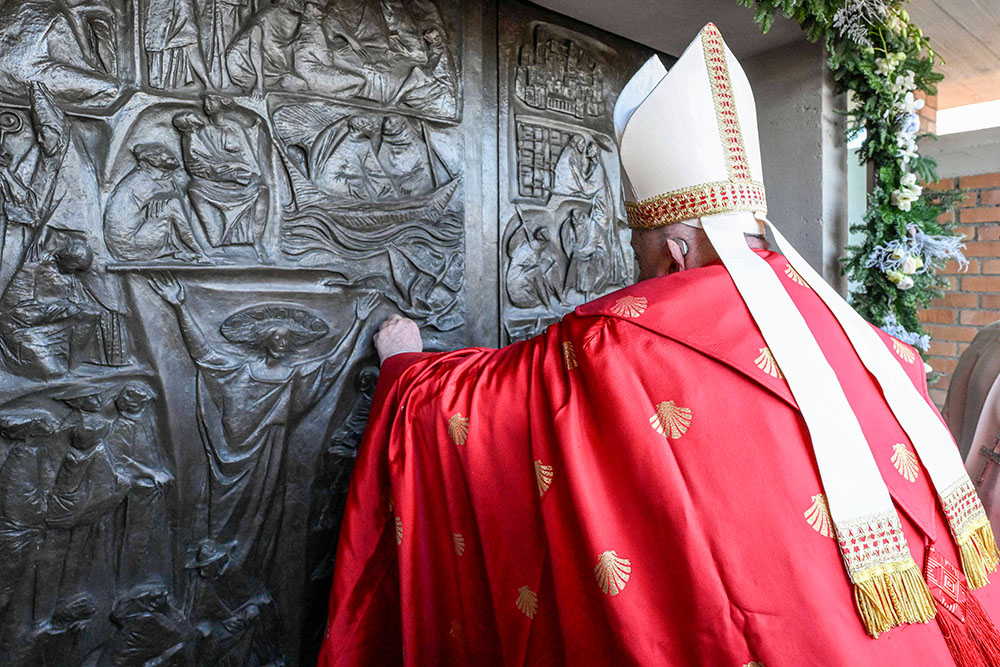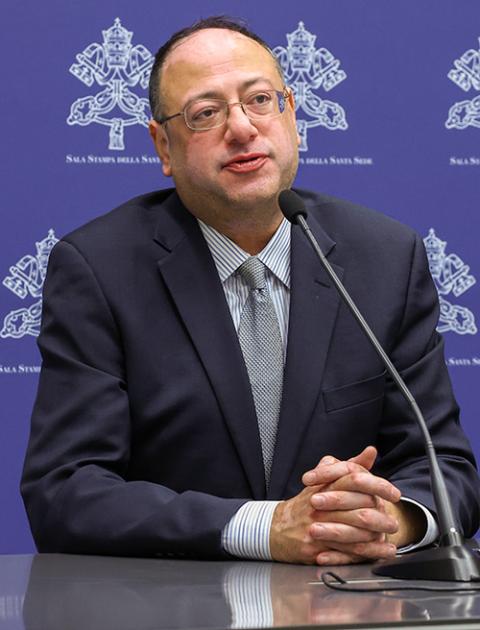
Pope Francis knocks on the Holy Door of the Church of Our Father at Rome's Rebibbia prison Dec. 26, 2024, before opening it and presiding over a Mass with inmates, prison staff and Italian government officials. (CNS/Vatican Media)
The Jubilee Year is, for many, about making a pilgrimage to Rome, walking through one of the Holy Doors at the various basilicas. Thanks to Pope Francis, there is a Holy Door at the Rebibbia prison. Such pilgrimages confer a plenary indulgence, the remission of temporal punishment for sins already forgiven, on those who make them.
In advance of the 2000 Jubilee, Pope John Paul II and many other religious leaders called for a different kind of remission, canceling the debt of impoverished nations. Jubilee USA was founded at that time to help make this retrieval of the ancient practice of forgiving debt during a jubilee a reality.
Francis, in his New Year's address, made debt forgiveness a central theme of this year's Jubilee as well. "The first to forgive debts is God, as we always ask him when we pray the Lord's Prayer, referring to our sins and committing ourselves to forgive in turn those who have offended us," the pope said. "And the Jubilee asks us to translate this forgiveness on a social level, so that no person, no family, no population is crushed by debts. I therefore encourage the rulers of countries with a Christian tradition to set a good example by canceling or reducing as much as possible the debts of the poorest countries."
The roots of the idea of a jubilee marked by debt forgiveness are found in the Hebrew Scriptures. I asked my friend Rabbi Yehiel Poupko, rabbinic scholar at the Jewish United Fund/Jewish Federation of Metropolitan Chicago, about this scriptural warrant.
"There are no Mitzvot [commandments] in the Torah about international borrowing and lending," Poupko told me. Nonetheless, "Deuteronomy 15 also makes clear that at some point debt can grow to be so significant that the normal processes of need, requesting a loan, making a loan, and paying back can accrue to such a degree as to bring normal economic life to a halt. Hence, the Torah provides for quite literally what we called during the Depression a bank holiday."
Advertisement
Other parts of Torah shed light on the ethics of debt. For example, in Exodus (22:24-26) we read, "If you lend money to My people, to the poor among you, do not act toward them as a creditor; exact no interest from them. If you take your neighbor's garment in pledge, you must return it to him before the sun sets; it is his only clothing, the sole covering for his skin. In what else shall he sleep? Therefore, if he cries out to Me, I will pay heed, for I am compassionate."
"Now comes the task of transferring from the Mitzvot that govern relations between individuals to relations between lender and borrower nations," said Poupko. "To put it plainly, the principles apply. The Torah never wants to see a situation in which one party — be it an individual or a nation — accrues such debt that the lender exerts imperium. That the lender feels that he or she can enter the home (or the country) of the borrower (Deut 24:10-11). Or, that the basic necessities of life, such as the night garment in Exodus 22:25 are no longer available to the borrower."
This year, the good people at Jubilee USA and their colleagues throughout the world want to make sure the poor nations of the world are not without their modern-day equivalent of a night garment.
"According to the World Bank, the 26 poorest countries, where 40% of the world's population lives on less than $2.15 a day, are choosing between the social needs of their people and making debt payments," said Eric LeCompte, executive director of the Jubilee USA Network. "The pandemic spurred greater food and debt crises around the globe and led to lost decades of development."

Eric LeCompte, executive director of Jubilee USA Network, speaks at a Vatican news conference to announce the campaign "Turn Debt into Hope" at the Vatican Dec. 23, 2024. (CNS/Justin McLellan)
"Rwanda struggles with more than half of the population living in extreme poverty and a third of their kids struggling with chronic malnutrition. Those numbers are growing," LeCompte said.
LeCompte looks back to the successes that grew out of the 2000 Jubilee effort as providing hope for the future.
"Because of Pope John Paul II, Pope Benedict [XVI] and the Jubilee 2000 movement, we won more than 130 billion dollars in debt relief and 54 million kids went to school in Africa who never would have seen the inside of the classroom," he told me. "Pope Francis is calling us to finish the unfinished work of Jubilee 2000 — for Jubilee 2025 we must create new international bankruptcy processes to end debt crises forever."
$130 billion sounds like so much money. But Forbes just estimated Elon Musk's personal wealth at $421.2 billion. In fact, his personal wealth grew by $213 billion last year. One man. One year.
The pope's encouragement helps bring the world's attention to the issue, but it is the hard work of groups like Jubilee USA that makes debt relief a reality. It is complicated stuff.
I wrote about their work helping religious leaders in Puerto Rico deal with the debt crisis the island faced in the last decade. In an interview at Commonweal, San Juan Archbishop Roberto González recently discussed the help LeCompte gave him and the island's other religious leaders.
Here in the U.S., liberal Catholics are preparing for the various menacing things Donald Trump is planning to do. Jubilee USA has a history of working across the aisle, and while debt forgiveness is not on the top of Trump's agenda, unless the debts are his own, perhaps some conscientious members of Congress can craft bipartisan legislation that addresses the clamant problem.
Whatever our economic problems here in America, we cannot even imagine the desperation of those living in extreme poverty. But we can do something about it.







